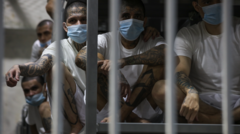El Salvador's President Nayib Bukele has made a bold proposal to Venezuela, suggesting the repatriation of 252 Venezuelan nationals deported by the United States, in exchange for the release of an equivalent number of political prisoners held by the Maduro government. The exchange was put forward in a direct message to Venezuelan President Nicolás Maduro via social media.
Bukele described many of the Venezuelans in question as individuals charged with serious crimes, including murder and rape. Meanwhile, he emphasized that the political prisoners in Venezuela were incarcerated simply for opposing Maduro. This proposal has sparked criticism from Venezuela's Chief Prosecutor Tarek William Saab, who demanded clarifications on the nature of the crimes committed by the deportees and their legal standing in El Salvador.
In his social media post, Bukele specifically called for a "humanitarian agreement" for the return of these deported individuals, further mentioning the presence of nearly 50 foreign nationals, including U.S. citizens, as part of the swap. Recently, over 200 Venezuelan nationals were sent back to El Salvador, many alleged to be affiliated with the Tren de Aragua gang, which was pointedly noted by the Trump administration.
Bukele has gained popularity due to his aggressive anti-gang policies, often referring to himself as "the world's coolest dictator." In contrast, Maduro has condemned the U.S. policy of deporting Venezuelans to El Salvador, claiming it to represent a violation of human rights, and labeling it as "kidnapping."
Since Trump took office, his administration's aggressive immigration measures, targeting Venezuelan migrants, have been met with various legal challenges, exemplified by the pause ordered by the U.S. Supreme Court on deportations linked to gang affiliations. Through the application of the 1798 Alien Enemies Act, Trump has enacted these policies without standard legal processes, a move that has not been undertaken since wartime.
As discussions around this potential exchange continue, it underscores the complex and often contentious interplay of U.S. immigration policy, human rights, and international diplomacy.
Bukele described many of the Venezuelans in question as individuals charged with serious crimes, including murder and rape. Meanwhile, he emphasized that the political prisoners in Venezuela were incarcerated simply for opposing Maduro. This proposal has sparked criticism from Venezuela's Chief Prosecutor Tarek William Saab, who demanded clarifications on the nature of the crimes committed by the deportees and their legal standing in El Salvador.
In his social media post, Bukele specifically called for a "humanitarian agreement" for the return of these deported individuals, further mentioning the presence of nearly 50 foreign nationals, including U.S. citizens, as part of the swap. Recently, over 200 Venezuelan nationals were sent back to El Salvador, many alleged to be affiliated with the Tren de Aragua gang, which was pointedly noted by the Trump administration.
Bukele has gained popularity due to his aggressive anti-gang policies, often referring to himself as "the world's coolest dictator." In contrast, Maduro has condemned the U.S. policy of deporting Venezuelans to El Salvador, claiming it to represent a violation of human rights, and labeling it as "kidnapping."
Since Trump took office, his administration's aggressive immigration measures, targeting Venezuelan migrants, have been met with various legal challenges, exemplified by the pause ordered by the U.S. Supreme Court on deportations linked to gang affiliations. Through the application of the 1798 Alien Enemies Act, Trump has enacted these policies without standard legal processes, a move that has not been undertaken since wartime.
As discussions around this potential exchange continue, it underscores the complex and often contentious interplay of U.S. immigration policy, human rights, and international diplomacy.
















